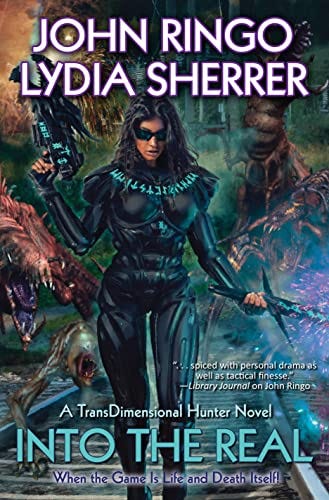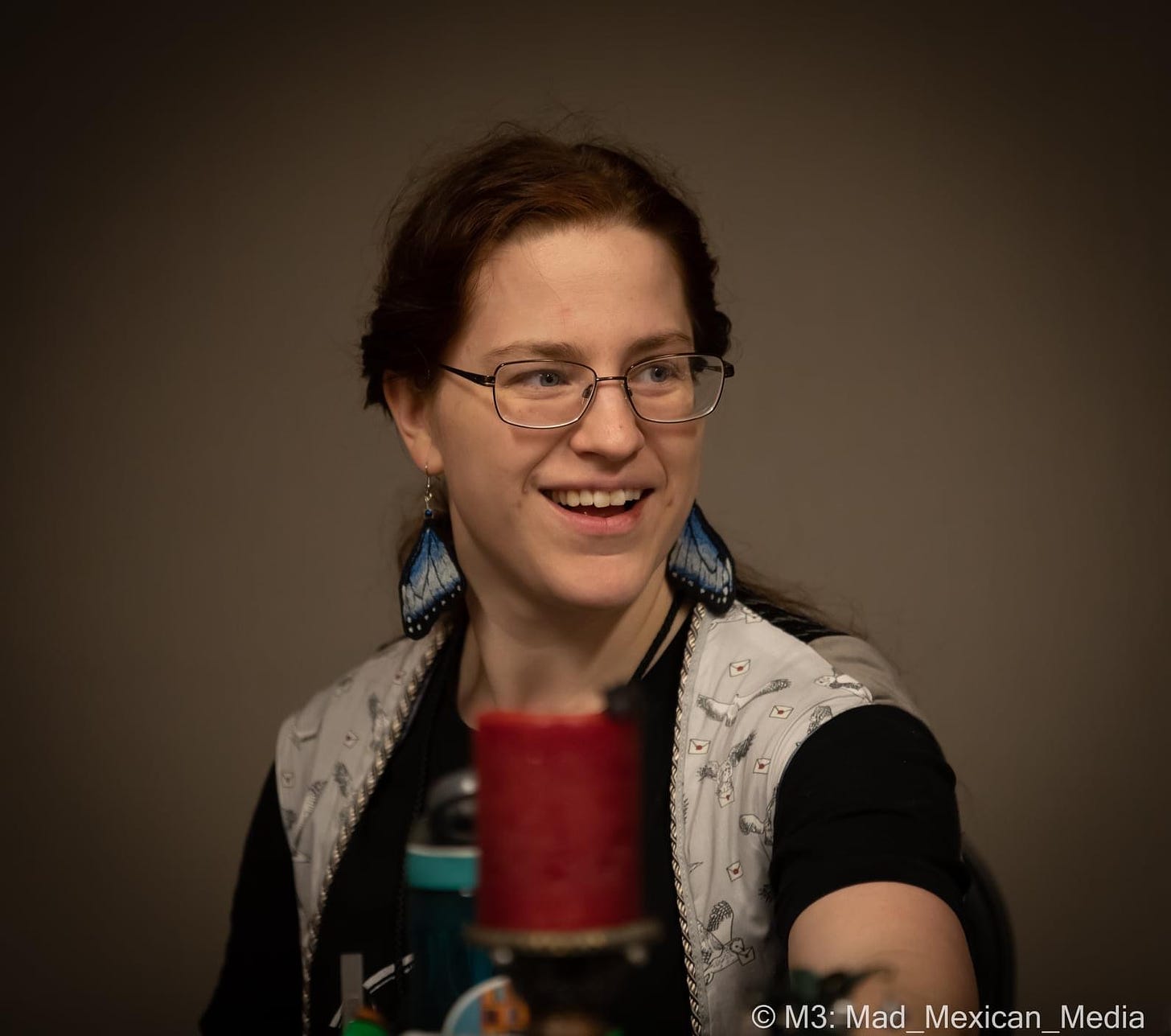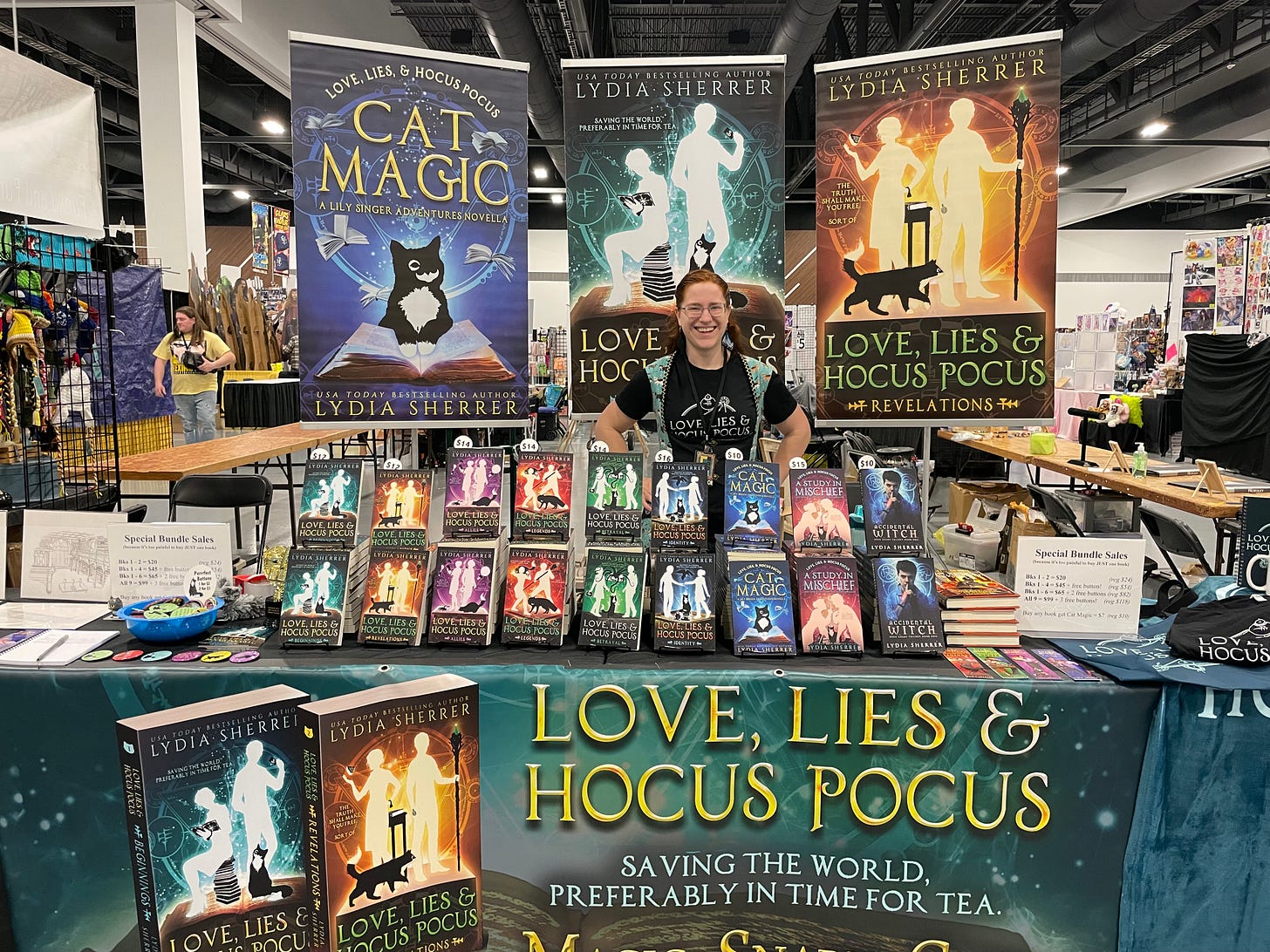Interview with "Into the Real" co-author Lydia Sherrer
Going down the high-tech rabbit hole with a bestselling author
Back in May, Upstream Reviews covered Into the Real, the latest book by John Ringo, this time with co-author Lydia Sherrer. Madam Sherrer was able to sit down with Upstream for a few minutes and discuss how Into the Real happened, and how the development process worked.
UR: How did this collaboration come about? I am aware that it started as a conversation at a convention. Did it start with Pokemon Go (which I know at least Ringo played at one point) and turn into “Augmented Reality would have been great in Ender’s Game”?
Lydia: The collab itself came about through John meeting me at a convention. To know how John originally got the story idea, you’ll have to ask him for that recounting, though from what I’ve gathered it was originally inspired by the Pokemon Go game coming out and John’s mind doing what John’s mind does.
But as for as the collab, John had been looking for a coauthor for the story idea for a while. He had originally thought he might co-write it with one of his daughters, but they either weren’t interested or didn’t have the time. So he’d been on the lookout for a female, preferably younger YA author to write Lynn’s voice (the 17 yr old protagonist). He met me in 2017 at LibertyCon 30, where I had my independently published books, the Lily Singer Adventures with me. I was in the author alley, busy making new fans, and he came by our table and took a quick browse through the books, and apparently liked what he saw. My husband also ended up chatting with him for a bit while I was talking to other people, and obviously my husband being my biggest fan and supporter did what he does and obviously left a great impression! John pulled me aside later that weekend and asked to chat and that’s where he explained about the story idea he had and the trilogy he was proposing and asked if I wanted to write it with him.
What is funny is that I was sure when he pulled me aside it was to scold me for something. I’m former military, he’s former military, and usually when someone “pulls you aside for a chat” it’s because you done screwed up. So I was all ready to get yelled at for some terrible faux pas I’d committed, it being my first professional writing convention. I even remember assuming parade rest at first as he talked to me. So you can imagine how confused I was when he started talking about writing a book with his daughters, and it was probably 5 minutes into the conversation until I realized what he was leading towards. Needless to say, once I figured out I was NOT in trouble, but in fact one of my literary heroes and a NYT bestselling author was asking little old me to co-write a book with him, I freaked out internally. I think I mostly managed to keep it inside and not scare John away by jumping up and down screaming, but it was a close thing. Obviously I said yes.
It took us another few years to get Toni (Baen’s head editor) on board with it, mostly because John had other projects going on Toni wanted him to finish at the time, etc. But John talked her around eventually and we started putting together the first book in early 2020. I think COVID delayed its release somewhat, which is why it took longer than would have been nice to get it out to the fans. But Book 2 is already halfway written and we plan on writing Book 3 before the end of 2022, so Baen can go ahead and release them both asap.
UR: How much influence did Ender’s Game have on Into the Real? Did it act just as inspiration? Or were the concepts so similar, it had to be acknowledged in the marketing?
LS: The influence was more generally inspirational than any kind of direct plot lines. Originally, I’d envisioned there being more of a plot twist in the first book, similar to the plot twist at the end of Ender’s Game, but of course if you’re going to say it’s like Ender’s Game in your marketing, you’re kinda showing your hand right there. So it ended up not being as much modeled after Ender’s Game as simply inspired by certain aspects of that great work (which I’m a huge fan of).
UR: Your award winning novels specialize in fantasy and wizards. How did you both reach the decision that Into the Real would be science fiction? It easily could have gone the other way.
LS: I think because the original idea was inspired by Pokemon Go and the dawn of augmented reality gaming, it was a pretty easy decision to go with science fiction over a fantasy setting. Also keep in mind that John Ringo is quite prolific in multiple genres, and I’ve always been interested in writing in multiple genres as well, so this was a delightful opportunity to do that. Our primary goal is writing amazing stories that bring readers all the feels and all the enjoyment. The genre is simply a means by which those stories are packaged and delivered. Good storytelling principles transcend genre. It was actually refreshing to write in a completely different genre than I was used to, because its helped me tweak my voice for the books to be closer to John’s and meld them better. I occupy a different headspace and emotional state when writing for the TransDimensional Hunter books than my Love, Lies, and Hocus Pocus universe books, and that helps them be distinct and shine with their own unique qualities.
4) How did the process of coauthoring Into the Real work? With Baen's Prince Roger series, David Weber wrote a 20,000 word outline, and Ringo did the rest. With the latest Dune books, Kevin J Anderson and Brian Herbert wrote alternate chapters, and made it a race. How did the process work here?
LS: It was pretty close to the Prince Roger books, at least for Book 1. John already had roughly 40,000 words of the start of the novel written, pretty rough, but covering the first few important plot points and the worldbuilding/tech. What I did, as a rabid outliner, was take that and create an outline for the first book and the series as a whole, as well as update the tech (his was originally set in the 2010s, so contemporary, whereas I took it to the near future of 2040. In John’s original 40k words, Lynn was using a smart phone to see the monsters just like you do/did for Pokemon Go). Once John and I agreed on the worldbuilding/tech/outline, I tweaked that first 40k words to make it fit and wrote the rest of the novel, then he added a bit and approved it all. For Book 2, I once again wrote a detailed outline, which we talked about, tweaked, and agreed on, and now I’m writing out set scenes, with a few gaps left here and there for specific other POVs and scenes that he will be doing. I’ll send that to him soon and he’ll add his parts, update/approve what I’ve done, then I’ll smooth things out prose-wise and send it back for final approval before it goes to the editor. That’s the plan at least!
UR: I once heard John Ringo quote "Jim Baen's law of coauthors," that he required authors to live six hours away from each other by driving, because "That's how long it takes to load up the guns on the truck, get on the road, calm down and turn back." Is that still a thing or did that not come up?
LS: I don’t specifically recall him quoting that to me, no. John’s a really awesome guy, I’ve loved al our collaboration phone calls which often last hours and I take copious notes to make sure I don’t forget any of the amazing and crazy things that come out of his mouth. It would be fun to get to sit down and collaborate some in person, but we work with what we have.
UR: Into the Real takes place about a generation from now, and part of the world involves aftereffects of all the Covid lockdowns. Was that an integral part of the world building, or is it a long-term prediction? Or did you just theorize "How badly can the culture overreact to this?"
LS: Don’t give us too much prediction credit, the Covid aftereffects were something I added as I wrote Book 1 from about Feb to July 2020, right when it was all happening. None of that was in John’s original 40k words written back in 2016 or so. Honestly something I’ve learned through experiencing the pandemic and imagining what 2040 would be like, is that systems and humans are a lot more resistant to change than you might imagine. I would say that there would have to be a pandemic with a much higher death rate that lasted much longer than Covid did to create the lingering effects we see in Into the Real. That’s not to say some aspects of Into the Real won’t still develop (like the emphasis on virtual learning, etc), but I don’t think they’ll develop for pandemic reasons. I really though the theater/movie-making industry was going to die, or at least be crippled permanently, by the pandemic, but it has bounced back pretty well. Humans like going to theaters to see movies, and they’ll keep paying to do it, so things are recovering on that front.
UR: One of the character threads involves dealing with someone who believes that "women cannot game." Have you seen this attitude? And was this supposed to be symptomatic of gaming in the future you created, or was it just strictly personal to a character with his own problems?
LS: The “girls got no game” thing was definitely a Ronnie thing, not meant to be symptomatic of the gaming world in general. However, as a woman, I have definitely come across this attitude, at least obliquely. I’ve never had a “Ronnie” type person in my life, but then I’m also not a serious gamer (I haven’t had time to game much in over a decade what with owning my own business and raising kids and stuff). Most of what I saw and experienced was women not being taken seriously because in general the gaming industry over sexualizes women and makes them (in the video games) as objects to be admired, not taken seriously. This isn’t to say that most men don’t take women gamers seriously, I wouldn’t say that at all. But more that I have found, as a gamer myself, that in general I get much more attention to my looks (in real life and my avatar) and the fact that I am female, than on my gaming skills or experience. I was never personally offended or hurt by this, I always just found it rather amusing. But I could definitely see a situation, especially among younger people with less life experience, of there being attitudes like this for those who haven’t been exposed to female gamers. But I would say that is an INDIVIDUAL thing, not an industry-wide thing. I would definitely not call the gaming industry as a whole misogynistic, but I could see there being individuals with misogynistic attitudes, especially in certain subcultures of gaming.
Interestingly, since releasing this book, I have heard from multiple people thanking me for writing about the struggles Lynn goes through in this regard because they’ve said this is an attitude they have personally seen and been hurt by. The impression I’ve gotten is that this extreme sort of attitude isn't common by any means, but that it certainly happens, and when it does it creates an incredibly toxic environment that make a lasting impression on the people experiencing it.
UR: Do you yourself game? If so, what do you prefer playing? Or playing on?
LS: I don’t game a lot these days, not like I used to when I was a teen and in college. Growing up I was a huge fan of Zelda, Spyro, Crash Bandicoot, Tomb Raider, Command and Conquer Red Alert, Diablo and a few other random games we had. Since the 90s and early 2000s, really the only online or video game I’ve played is some WOW, Gears of War, and the Diablo franchise. I’ve switched much more to tabletop gaming as a means of hanging out with my husband and our friends, so most of my gaming involves things like Arkham Horror, DnD, DiceForge, Ascension, etc. I would call myself a casual gamer, married to a dedicated gamer, who definitely helped out a lot with developing the gaming system for TD Hunter in terms of stats and numbers and leveling and such.
UR: One subplot for Into the Real involves a particularly psychotic mean girl. Have you ever experienced something like her, or did you just ponder “How can we weaponize a YA trope to be a threat?”
LS: I have never had a “mean girl” in my life, for which I am thankful. But then I was also homeschooled K-12th grade, so I never experienced the environment that Lynn experienced and had to write it pulling from imagination, popular culture, and other people’s anecdotes, as well as basic human nature and psychology. Honestly Elena isn’t psychotic in the technical term. There are very real and concrete psychological reasons for her behavior that have everything to do with her relationship with her father, how she was taught to behave by the role models in her life, and the state of technology and what it encourages in people for those who become addicted to it and dependent on it. Elena is a perfect storm of things going wrong. That’s not to say her actions are justified, but they are logical considering her environment and influences, and are a tale of caution for anyone raising teenagers right now in this age of social media.
9) Where can we find out more about your work?
LS: My website is www.lydiasherrer.com, which has everything about me and my books as well as our online store where you can get signed copies of my books and various other merchandise, swag, our new game, etc.
If you’d like to learn more about my fantasy books with magical adventure and a snarky talking cat, check out www.loveliesandhocuspocus.com
I’m most active on Facebook in terms of social media. I have an author page and a private group for my readers which you can find here:
https://www.facebook.com/lydiasherrerauthor
https://www.facebook.com/groups/LydiasVIPReaderGroup
If you prefer Instagram, I’m also there as @lydiasherrer. A lot of cat pictures happen there. And I mean A LOT.
If you’re on youtube, you can see what I USED to do as a hobby before I was writing full-time, which was play the Ocarina! Most of my recent stuff is slice of life of an author and cat videos. You can find my channel at https://www.youtube.com/c/lydiasherrer
I also have a Patreon where I post monthly content for my fans who want to get more involved, support what I’m doing, and enjoy extra content while waiting for the next book to come out.







